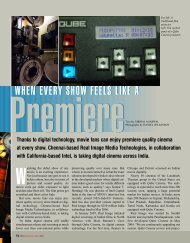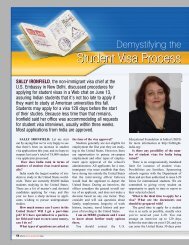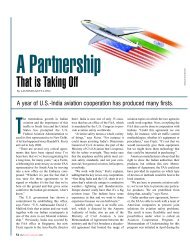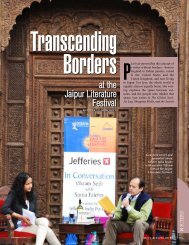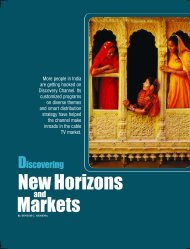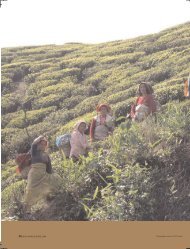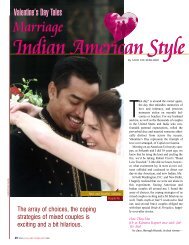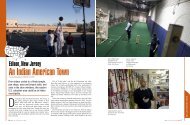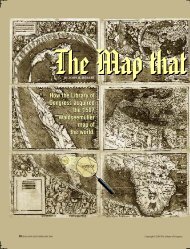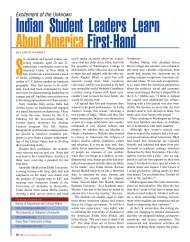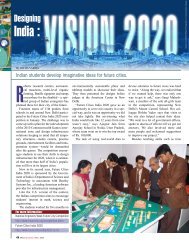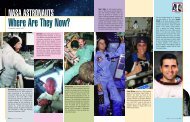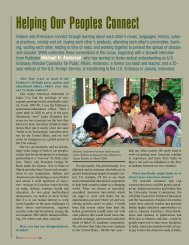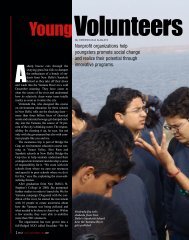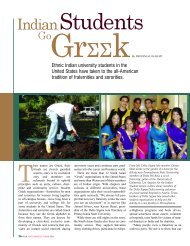You also want an ePaper? Increase the reach of your titles
YUMPU automatically turns print PDFs into web optimized ePapers that Google loves.
BHASKAR RAJAH<br />
Afriend’s offer of a movie and a ride on<br />
a motorbike enticed BHASKAR<br />
RAJAH to listen to a speech on<br />
<strong>American</strong> education by a Foreign Service<br />
officer in his hometown of Chennai some<br />
25 years ago. Now Rajah, the U.S.<br />
Assistant Public Affairs Officer in Calcutta,<br />
gives similar speeches, encouraging young<br />
Indians to widen their horizons.<br />
Rajah’s friend wanted to go to the<br />
United States to study, and asked his<br />
buddy to come along to a seminar at the<br />
<strong>American</strong> Center. “I said I am not going,”<br />
Rajah recalls. “But he said, ‘Well, we can<br />
go to a movie afterward.’ And he had a<br />
wonderful motorbike and I always wanted<br />
to ride his bike, so he said, ‘Maybe you<br />
can ride it on the way back.’After hearing<br />
the <strong>American</strong> officer speak, a lot of us in<br />
the audience broadened our perspectives<br />
on higher education in the U.S. As luck<br />
would have it, two years later, I went<br />
to the U.S., to Ohio, as an exchange<br />
visitor, and my friend who took me<br />
to the seminar never did go.”<br />
Rajah’s first experiences weren’t<br />
all pleasant. “Cleveland was cold,<br />
and the wind off Lake Erie started<br />
blowing too early in October,” he<br />
recalls. “Also, in 1982, the<br />
university was in deep financial<br />
problems and during my first<br />
semester they said they would not be<br />
able to offer me a continued<br />
scholarship for my MBA program.” So<br />
Rajah turned to Oklahoma, which was<br />
experiencing an oil boom, and accepted<br />
an offer from the State University, where<br />
he earned his degree. “I got a wonderful<br />
education and above that, it gave me an<br />
insight into those parts of the U.S., the<br />
heart of America, which otherwise I<br />
would never have understood,” he says.<br />
When his studies ended, Rajah attended<br />
the 1984 summer Olympics in Los<br />
Angeles and toured as much of the United<br />
States as he could, thinking he would<br />
never get a chance to come back.<br />
In Colorado, a horseshoe distributor<br />
offered him room and board in return<br />
for setting up some computers. The<br />
man’s business was suffering, so over<br />
JAYALAKSHMI BHASKAR<br />
breakfast, Rajah used his knowledge<br />
from his MBA program to suggest<br />
avenues for diversification. “One of<br />
them was manufacturing and that has<br />
kept him going for the last 20 years. We<br />
are good friends, still,” says Rajah. “We<br />
would go horseback riding on the slopes<br />
of the Rocky Mountains and that is one<br />
of my best memories.”<br />
When Rajah returned home, however,<br />
he found it hard to get work. “The typical<br />
response I got was, ‘You are overqualified;<br />
you have been to the U.S. and we don’t<br />
think you will really stay here for long.’ ”<br />
Eventually, an Indian company sent him to<br />
Chicago to start up a U.S. office. It was<br />
there that he met his wife to be, with whom<br />
he now has three daughters, and where he<br />
“I liked what America stood for, the<br />
multiculturalism, democracy that is ingrained<br />
in the society, the independence, the quest for<br />
fairness, the support of individual rights.”<br />
KARUNA SINGH<br />
Above: Bhaskar Rajah and daughter Vijaishri<br />
at the Calcutta Consulate swimming pool.<br />
Left:Rajah gives a booklet on U.S.-India<br />
relations to Assam Chief Minister Tarun Gogoi.<br />
later became a U.S. citizen. “I felt I was<br />
completely in sync with U.S. ideals and<br />
philosophies and I saw myself as culturally<br />
an Indian and in politico-economic perspectives<br />
an <strong>American</strong>,” he says. “I liked<br />
what America stood for, the multiculturalism,<br />
democracy that is ingrained in<br />
the society, the independence, the quest for<br />
fairness, the support of individual rights.”<br />
He worked in international business,<br />
banking and information technology in<br />
Australia, Dubai, San Francisco and India<br />
before he was encouraged to join the<br />
Foreign Service by Hugh Williams, then the<br />
U.S. consul in Chennai. There were some<br />
bureaucratic glitches in the process. At<br />
one point, Rajah said, he was told his<br />
application was denied and closed, because<br />
the Immigration and Naturalization<br />
Service still had him listed as a student in<br />
Oklahoma and could not verify his<br />
citizenship.<br />
Rajah responded, “That’s the one thing<br />
I can prove.” <br />
SPAN SEPTEMBER/OCTOBER 2005 45



